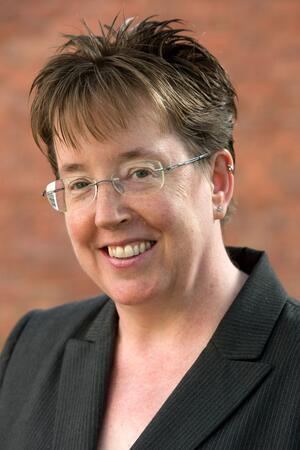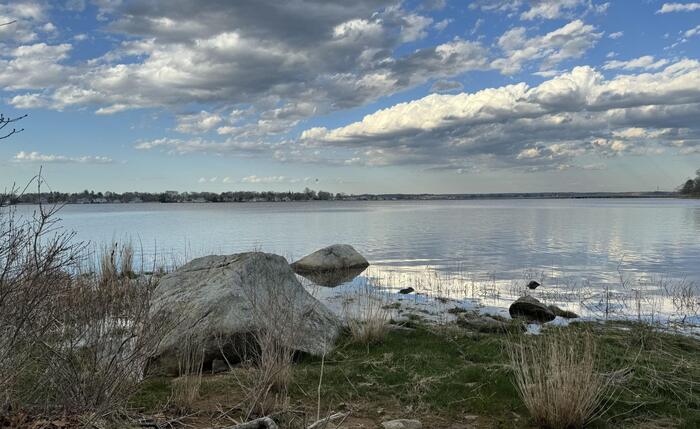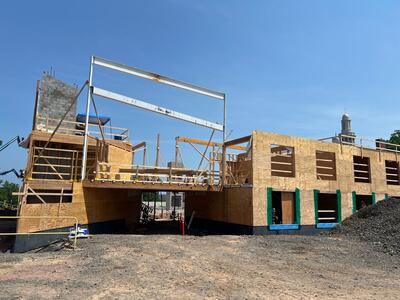By Pressley Peters
 Carolyn Sharp ’94 M.A.R., ’00 Ph.D. is a professor of homiletics at YDS and has been a member of the faculty since 2000. In addition to her Yale and YDS degrees, she holds a B.A. in Religious Studies from Wesleyan University. Professor Sharp is also an Episcopal priest.
Carolyn Sharp ’94 M.A.R., ’00 Ph.D. is a professor of homiletics at YDS and has been a member of the faculty since 2000. In addition to her Yale and YDS degrees, she holds a B.A. in Religious Studies from Wesleyan University. Professor Sharp is also an Episcopal priest.
As a professor, she strives to equip students to confront the climate crisis. Each spring, she teaches Preaching for Creation, a course designed to build the capacity of new generations of preachers for ecologically powerful preaching.
As a scholar, Sharp uses biblical narrative art, feminist perspectives on power, and ecotheology as resources for Christian homiletics and congregational faith formation. She has written or edited sixteen books, several with a focus on the Hebrew prophets. Her two current book projects are centered on Colossians and the Gospel of Matthew.
In 2023, Sharp was given the Distinction in Theological Education award by the YDS Alumni Board in recognition of her scholarship, teaching, and contributions to vocational formation for ministry. She was recently appointed Homiletician-in-Residence for a project housed at Lexington Theological Seminary titled “Compelling Preaching for a Climate-Changed World.”
Sharp and her husband, Leo Lensing, gave to the Living Village residence hall building project in support of the Divinity School’s We Are Called fundraising campaign. The Living Village will be the largest regenerative housing complex on a university campus, and its design and construction follow the world’s most stringent sustainable building standards. She has also supported several YDS memorial or honorary funds to generate scholarship income.
How did you become interested in ecotheology?
Through the study of biblical prophets who spoke truth to systems of militarized colonization and economic predation, I’ve observed the ways in which exploitation, oppression, and ecological devastation undermine communities across the globe.
I have been a vegetarian for ethical reasons since I was a doctoral student. My husband and I live at the edge of a salt marsh on the Connecticut coast. Marshes are essential to ecosystem health, and while resilient, they are also fragile. I have been astonished by the beauty of the place, which is teeming with wildlife. Connecting to the living biome of the shoreline has deepened my concern for ecological preservation.
 I believe preachers have a vital role to play in advocating for the living community of Earth as the climate catastrophe continues to unfold. Churches are desperate to reconfigure their theology and ethics in light of what we are learning about human-caused harm to biomes and the entire planet. YDS is extraordinarily well positioned to assist communities of faith in this important work.
I believe preachers have a vital role to play in advocating for the living community of Earth as the climate catastrophe continues to unfold. Churches are desperate to reconfigure their theology and ethics in light of what we are learning about human-caused harm to biomes and the entire planet. YDS is extraordinarily well positioned to assist communities of faith in this important work.
What part of the Divinity School’s recent work most appeals to you, and what inspires you about YDS’s future?
I support the Living Village because it will teach generations to come—through its inhabitants and programming, its architecture, and its Living Building Challenge-certified green energy processes—that we must build toward flourishing in new ways in our climate-changed world. I am inspired by YDS’s willingness to transition toward green energy and a more holistic positioning of our resources regarding the living community.
Student scholarship is another cause about which I am passionate. I have contributed to Divinity funds in memory of Lana Schwebel and Yolanda Smith, two enormously talented colleagues who died prematurely, and to the fund recently established in honor of registrar Lisa Huck, a cherished friend who has been a phenomenal support of YDS students, staff, and faculty.
I am inspired by our emphasis on training innovative leaders. In this regard, I celebrate our partners on the Quad: the Institute of Sacred Music, which offers so much to YDS, and all of Yale, with the excellent Martin Jean at the helm; the impressive feminist leadership of Sarah Drummond at Andover Newton at Yale; and Berkeley Divinity School’s Transforming Leaders program, directed by the marvelous Brandon Nappi with the support of Berkeley’s superb Dean, Andrew McGowan.
How do you imagine your generosity might impact YDS students, the Divinity School, and our world?
 I hope my gifts to the school will help ensure a place in this community for brilliant students from many cultural and economic contexts. Our students’ giftedness and courage continually amaze me. No one should be prevented from pursuing education at YDS due to economic challenges. My family had very limited resources when I was growing up; I needed a lot of financial aid to complete my undergraduate degree and my YDS master’s degree. I hope to assist others to pursue their own vocational callings here with all the resources they need for success.
I hope my gifts to the school will help ensure a place in this community for brilliant students from many cultural and economic contexts. Our students’ giftedness and courage continually amaze me. No one should be prevented from pursuing education at YDS due to economic challenges. My family had very limited resources when I was growing up; I needed a lot of financial aid to complete my undergraduate degree and my YDS master’s degree. I hope to assist others to pursue their own vocational callings here with all the resources they need for success.
Our students are on the cutting edge of transformative change in countless sectors of public life: they are grace in action!
How has giving has been joyful or personally significant to you?
I am joyful to support YDS because for me, this school has been a place of professional growth and spiritual formation, lively theological interchange, and affirmation of the value of risk-taking for the sake of the world God so loves.